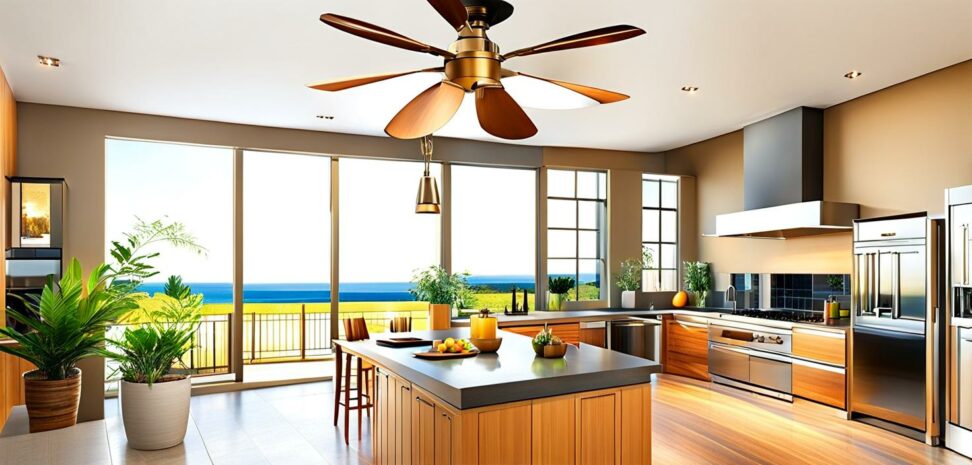10 Tips for Selecting the Best Kitchen Ceiling Fan for Your Home
Installing a ceiling fan in your kitchen can make a big difference by improving air circulation and providing much-needed lighting over your countertops. But with so many options on the market, it can be tricky to determine which model will work best for your kitchen's size, layout, and style.
Follow these 10 tips to find the ideal kitchen ceiling fan to meet your needs:
Measure Your Kitchen's Dimensions
First, carefully measure the length, width, and ceiling height of your kitchen. This will determine the optimal blade span and mount type for your space. As a general rule of thumb:
- Ceiling fans should have a blade span of 36-44 inches for most kitchens.
- Fans should hang at least 7 feet above the floor.
- Larger kitchens may accommodate larger ceiling fans up to 52 inches.
Make sure there is sufficient clearance from cabinets, islands, and other obstacles for proper airflow.

Consider Different Mounting Styles
Kitchen ceiling fans come in three main mounting styles:
- Flush mount - Mounted directly to the ceiling, best for low ceilings.
- Downrod mount - Hangs down on a rod, optimal for high ceilings.
- Low profile/hugger - Mounted closely to the ceiling, good for cramped kitchens.
A downrod mount is best for maximum airflow, while a flush or hugger mount has a more low profile aesthetic. Choose based on your kitchen's dimensions and your style preferences.
Select the Right Fan Size
A 36 to 44 inch ceiling fan is recommended for most kitchens. Go smaller if you have a petite kitchen, or larger for big, open kitchens. The blades should be at least 2 feet from walls and islands for optimal airflow.
Larger ceiling fans move more air, but an oversized fan can be excessive in a small kitchen. Likewise, undersized fans won't sufficiently circulate air throughout your kitchen.
Kitchen Fan Size Recommendations
- Small kitchens under 150 sq ft: 24-36 inches
- Medium kitchens 150-300 sq ft: 36-42 inches
- Large kitchens 300+ sq ft: 44-52 inches
Choose a High-Efficiency DC Motor
Your ceiling fan's motor impacts both energy-efficiency and noise levels. Brushless DC motors use 10-30% less energy than standard AC motors. They also tend to run quieter.
Look for reversible settings so you can optimize airflow direction for summer and winter use. High-quality motors have a lifespan over 15 years for long-lasting performance.
Get Sufficient Lighting Brightness
Having built-in LED lighting on your kitchen ceiling fan is highly recommended. Look for lumen output of at least 2000-3000 lumens to sufficiently illuminate your countertops and work areas.
Task lighting with adjustable brightness helps for food prep, cooking, and ambiance. Consider smart features like voice-activated dimming for hands-free control.
Lighting Tips
- 3000K color temperature is optimal for kitchens.
- Dimmable LED lights allow ambiance control.
- Look for shatterproof or enclosed light covers.
Choose Blade Design for Airflow
Your fan's blade design directly impacts airflow efficiency and noise levels. Curved blades move air well with less noise compared to flat blades. Angled blades (pitched at 12-14 degrees) can further maximize air circulation.
Three, four, or five blade configurations are common. More blades push more air, but may require a more powerful motor.
Blade Tips
- Curved blades reduce drag and airflow noise.
- Pitched blades optimize airflow circulation.
- Wooden or palm leaf blades offer a unique, eco-friendly look.
Consider "Smart" Remote Controls
Many modern ceiling fans come WiFi-enabled for app and voice control through smart home systems like Google Home, Amazon Alexa, or Apple HomeKit.
Smart fans allow you to turn lights on/off, adjust fan speeds, set schedules and timers, and more using your smartphone or tablet, without needing to get up and find the switch.
Smart Features
- Control fan via app, voice assistant, wall panel
- Create custom schedules and scenes
- Works with smart smoke detectors for auto shut-off
Look for Important Safety Features
Due to the hot, humid, and greasy environment of kitchens, your ceiling fan needs certain safety features:
- Damp rating - Protects against moisture and humidity
- Fire-safe - Overheats safely to prevent fires
- ETL/UL-listed - Third party certified for quality and safety
Also consider convenient extras like separate fan/light controls, integrated smoke detectors, and automatic timers.
Select the Right Finish
Pick a ceiling fan finish that matches your kitchen's decor and color scheme. The most popular options include:
- Brushed Nickel, Oil-Rubbed Bronze - Warm metallic finishes
- Matte Black, Polished Nickel - Sleek, modern looks
- Wood Grain - For a natural, eco-friendly ambiance
Blade finishes like wood, whitewashed, or palm leaf also complement kitchen styles from traditional to contemporary.
Choose a Reputable Brand
Look for kitchen ceiling fans from top manufacturers like Hunter, Harbor Breeze, Westinghouse, and Minka Aire. These companies are known for quality, performance, durability, and quiet operation.
Compare specs like motor type, blade design, CFM airflow, noise level, warranty length, and smart features to pick the best model in your budget.
- Hunter - broad range, best for value
- Harbor Breeze - beautiful modern aesthetics
- Minka Aire - ultra-quiet DC motors
- Westinghouse - high quality with integrated lights
Choosing the perfect kitchen ceiling fan for your needs and style doesn't have to be difficult. Keep these handy tips in mind, and you'll be sure to find a top-rated ceiling fan that will keep your kitchen cool for years to come.